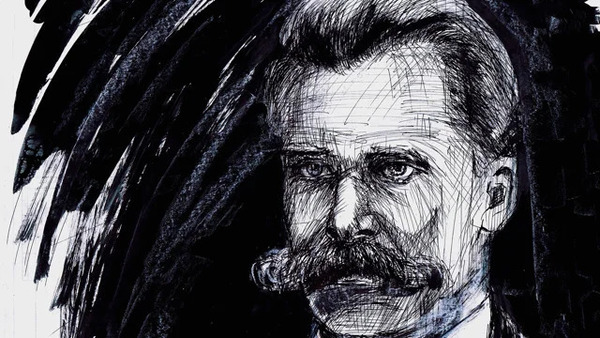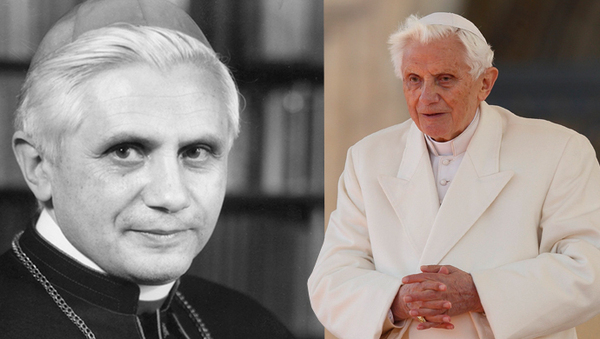“Where is God?” says the madman of Nietzsche’s “The Gay Science’ (Bk III, 125).
“I’m looking for God! I am looking for God!” he feverishly repeats at the Marktplatz to an unconcerned, or rather, jubilant audience of atheists, while frantically searching around with a lighted lantern in the hell-ish* light of day, as though for a needle in the haystack.
An act of madness, right? Surely! A lighted lamp in the bright day?
Laughing mockingly, these atheists answered the madman, one after the other, “I’ll tell you! We have killed him – you and I! We are all murderers.” (Ibid).

And there was it – the birth of the dubious Nietzschean aphorism, “God is dead.” In these dubious words, Nietzsche sought on the one hand to applaud the course of the history of thought (from Descartes’ cogito through the Enlightenment’s instrumentalization of reason) that had culminated in ousting God from social consciousness, such that, as he says, “Whoever is born after us will on account of this deed [our killing of God] belong to a higher history than all history up to now.” (Ibid). On the other hand, he sought to highlight the predicament of so-called modern man, ‘naturally’ an atheist, who must now rise to the challenge of becoming truly himself, that is, derÜbermensch (superman, overman) – a self-creating god. In Nietzsche’s post-theistic world, one either becomes an overman or a letzter Mensch (last man), an epitome of weakness and modernity’s failure to completely emancipate humanity from all externally imposed values. Nietzsche’s last man is the antithesis of the “will to power” and the ascendancy of the Übermensch. According to him, it was only on a Schopenhauer-like atheism that the “victory of Europe” could be premised, precisely as that “most fateful act of two thousand years of discipline for truth that in the end forbids itself the lie of faith in God.” (Ibid., Bk V, 357). For Nietzsche, the “good European,” evolved, matured, and post-Enlightened, must be likewise post-moral, post-Christian, post-ecclesia. (Ibid). Indeed, an ‘apocalypse,’ annihilation of God!
No kidding! This has become an existential given in today’s Europe, and in fact, the West, and even to some extent, the world, given the pervasive influence of European culture.
Notwithstanding, there has arisen amidst such decadence, among others, the towering prophetic voice of the great theologian, Joseph Ratzinger (later Pope Benedict XVI), whose lifelong engagement with the modern culture could be described as a “calling out” of this Nietzschean worldview for its fallacious deception that ends not in the utopia of a so-called emancipated humanity, but in a mire of real dystopia.
Of many places in his oeuvres, my mind naturally turns to Ratzinger’s “Introduction to Christianity,” wherein he recalls Kierkegaard’s story of the circus clown and the tent that caught fire. Already in costumes, the clown ran to the nearby village to warn them about the fire, lest it spread and destroy their homes. Everyone took his message for an extended joke. Well, he was in costume! The more he insisted, the more they laughed. Ratzinger visions the theologian’s task today in the character of the clown. Both Nietzsche’s madman and Ratzinger’s clown live in the aftermath of the “death of God.” At a deeper level, however, they serve very different purposes. Nietzsche’s madman must fall into silence at the news of God’s death. Nietzsche weaponizes this silence and the unrespectable character of madness into a definition of the defeated posture of the seeker of God. Quite contrarily, Kierkegaard’s clown becomes for Ratzinger an image of today’s theologian amidst a Nietzschean world marked by doubt and the threat of nihilism. Cognizant of his own struggle with doubt, since he lives within this same world, the theologian doesn’t give-up nor fall silent as the madman, rather, he finds in the very doubt an opportunity to engage the world in the conversation of faith. (Intro, 39-45ff).

In the Nietzschean world, “might is right” (like for Thrasymachus), the good simply means “better than,” reason is reduced to ratio or techne (instrumentalized and post-ethical), and the only true virtue is the “will to power.” Consequently, human dignity, as history has taught us, eviscerates on the flames of might, domination, violence, and war. As Ratzinger enumerates, one need only turn to horrifying examples like Hitler of Germany, Pol Pot of Cambodia, the atomic bomb, and the World Wars, to see the devastating effects of the pathology of reason that has divested itself from God and religion. Such reason ceases to be a constructive force but instead opens itself to powers of destruction. (Values in Time of Upheaval, 110-11). For example, Auschwitz has since remained a symbol of the epic failure of “reason” left to itself. Johann Baptist Metz is big on this. Even the critical theorist and follower of Max Weber, Jürgen Habermas, agrees with Ratzinger on the necessity of founding “ethical life” in the free society on something other than the whims and caprices of the mighty. However, while he proposes the foundation to be the “practical reason of a post-metaphysical character,” Ratzinger points to something even more fundamental, a true philosophical attitude, which is ultimately the search for God (quaerere Deum). It is this attitude that opens up reason to the permeating light of the truth of human existence, origin and destiny. Anything short of this is deception, for “thirst for the infinite is the very essence of human nature.” (Christianity and the Crisis of Cultures, 86). Furthermore, neither consensus, nor power, nor law, as political givens or goods or rights, for example, can answer the more fundamental questions of the sorts, “How does law come into being?” and “What must be the characteristics of law if it is to be the vehicle of justice rather than the privilege of those who have the power to make the law?” (Dialectics of Secularization , 11-15, 55-59). Clearly, Nietzsche’s Übermensch, his ‘apocalypse’ of God does not cut it!
Ratzinger subverts this Nietzschean ‘apocalypse’ of God. He proclaims a totally new kind of apocalypse, which, rather than be an ‘annihilation’ of God, is instead a radical revealing of God, in the true Johannine sense of the apocalypse. While Nietzsche’s “dead God,” precisely because we have killed him, amounts to the annihilation of humanity itself, Ratzinger (and the Christian tradition) proclaims a God whose voluntary self-emptying in death is the very source of the flourishing of humanity. In stupendous irony, Ratzinger’s Last Man, Jesus of Nazareth, in weakness and humble vicarious suffering unto death pro nobis, precisely by refusing to cling unto the “will to power,” has revealed the true power of man as rooted in God alone. He is a retort against a Nietzsche-like nihilism. He is God, truly dead, but very much truly alive! In place of the atheists’ mockery at the Marktplatz, we can imagine Ratzinger repurposing for Europe the victory chant of the Book of Apocalypse, “I am the First and the Last. I am the Living One; I was dead, and now look, I am alive forever and ever! And I hold the keys of death and Hades.” (Rev 1:18). Only the latter is truly capable of emancipating humanity!
* “Hell” is the German word for “bright.”
Suggested Further Reading
Benedict XVI / Joseph Ratzinger. Christianity and the Crisis of Cultures. Translated by Brian
McNeil. San Francisco: Ignatius Press, 2006.
———. Introduction to Christianity. Translated by J. R. Foster and Michael J. Miller. San Francisco, CA: Communio Books, 2004. [Especially Chapter One].
———. Values in a Time of Upheaval. New York: San Francisco: Crossroad Pub. ; Ignatius,
2006.
———. “Address to the Representatives from the World of Culture.” Meeting, Collège des
Bernadins, Paris, September 12, 2008. https://www.vatican.va/content/benedict-
xvi/en/speeches/2008/september/documents/hf_ben-xvi_spe_20080912_parigi-cultura.html.
———. “General Audience: Reflection on the Name Chosen: Benedict XVI.” Vatican, Rome,
April 27, 2005. https://www.vatican.va/content/benedict-xvi/en/audiences/2005/documents/hf_ben-xvi_aud_20050427.pdf.
———. “General Audience: Saint Benedict of Norcia.” St. Peter’s Square, April 9, 2008.
https://www.vatican.va/content/benedict-xvi/en/audiences/2008/documents/hf_ben-xvi_aud_20080409.html.
———. “Meeting with Members of the Academic Community.” Address by the Holy Father at
Vladislav Hall in Prague Castle, September 27, 2009. https://www.vatican.va/content/benedict-xvi/en/speeches/2009/september/documents/hf_ben-xvi_spe_20090927_mondo-accademico.html.
Benedict XVI, and Jürgen Habermas. The Dialectics of Secularization: On Reason and Religion. Translated by Brian McNeil. San Francisco: Ignatius Press, 2006.
Benedict XVI, and Marcello Pera. Without Roots: The West, Relativism, Christianity and Islam. New York, London: Basic Books, 2007.
Nietzsche, Friedrich. The Gay Science: With a Prelude in German Rhymes and an Appendix of Songs. Edited by Bernard Williams. Translated by Josefine Nauckhoff. Cambridge: Cambridge University Press, 2004. [Especially Books III and V].
———. The Will to Power. Translated by Anthony M. Ludovici. Dover edition. Mineola, New York: Dover Publications, Inc, 2019. [Especially Book IV, No. 1052
About the author

Tegha A. Nji, a diocesan priest from Cameroon, is a Ph.D. Candidate in systematic theology at the University of Notre Dame, IN. He received his STL and Th.M. from the Jesuit School of Theology of Santa Clara University, Berkeley, California. His dissertation project researches how an understanding of election in Joseph Ratzinger, from point of view of creation and anthropology, and in dialogue with Henri de Lubac et al, could serve as a critique of modern individualism.
Originally published by at eitw.nd.edu on April 30, 2024.